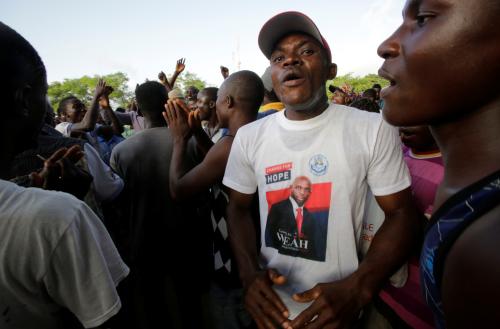Election corner: Odinga withdraws in Kenya, Liberia votes, and DRC delays to 2019
This week, Kenyan opposition leader Raila Odinga withdrew from the presidential election re-run, stating, “All indications are that the election scheduled for 26 October will be worse than the previous one.” Odinga does not believe that the upcoming elections will be free and fair and hopes that his withdrawal will allow the commission enough time to introduce reforms, which he says will yield a more credible election. Earlier this fall, the Kenyan Supreme Court annulled the August 8 elections, citing irregularities and illegalities. Following Odinga’s announcement, the Kenyan Parliament, where Uhuru Kenyatta’s Jubilee party holds the majority of seats, passed an amendment to the electoral law, allowing a candidate to automatically win if the opponent withdraws. The amendment was met with protests from Odinga supporters who fear that the new law entails a guaranteed victory for President Kenyatta, who won the August 8 elections with 54 percent of votes according to the Kenyan Independent Electoral and Boundaries Commission.
In other electoral news, on Tuesday, Liberians took to the polls to elect a president, as President Ellen Sirleaf Johnson completed the constitutionally allowed two terms. The historic elections mark the first time the country has independently run a presidential election without assistance from the United Nations. Regional observers praised the peaceful electoral process. As of Friday morning, official results were not announced. Nevertheless, reports state that former soccer star George Weah is in the lead.
In additional electoral news, the Democratic Republic of the Congo’s electoral commission stated on October 11 that the presidential elections, which were scheduled for December 2016, will be delayed until mid-2019. The commission is currently in the process of enrolling voters. Once that process is complete, it says it will need 504 days to pass laws setting voter constituencies, obtain voting materials, and recruit personnel. President Joseph Kabila’s term ended in December 2016, in an agreement made with the opposition, but he was allowed to remain president until elections were held this year.
Nigeria begins trials for Boko Haram suspects
On Monday, October 9, Nigeria began trials for 1,669 suspected Boko Haram militants at a court on the military base of Kanji. The trials are being carried out behind closed doors with no access for either the media or the public. The Boko Haram insurgency has so far claimed about 20,000 lives and displaced two million people in northeast Nigeria. After these trials are completed, Nigeria will begin trials for 651 other Boko Haram suspects being held at prisons in Maiduguri. These trials represent an important step forward given that only 13 Boko Haram suspects have ever been prosecuted and that suspected militants had been held in military prisons for years without charges brought against them.
By Friday, October 13, Nigeria had completed arraignments for 575 suspects, handing down sentences between three and 31 years to 45 suspects. Of the remaining, 468 were discharged and 28 cases were remanded for trial in the capital, Abuja, or in the city of Minna in west-central Nigeria.
The closed-door process has raised several concerns about the fairness and transparency of the process. Matthew Page, an analyst interviewed by The Guardian noted that “there are good reasons to believe that large numbers of the detainees have very little or no connection at all to the group.” The large number of cases has also raised concerns about the capacity of the judicial system to fairly complete so many trials. Amnesty International Nigeria is concerned with the closed-door process saying that “public hearings are crucial for protecting an individual’s right to a fair trial and due process.” In a statement, the Justice ministry said “we are here to ensure that nobody is persecuted. We are here for prosecution and so we have come with open minds.”
New business regulations in Tanzania draw ire and Magufuli reshuffles his cabinet
President John Magufuli of Tanzania has been making waves this week. On October 7, he announced a reshuffling of his cabinet and, notably, split the Ministry of Energy and Mining in two. Former deputy of the Energy and Minerals Agency, Medard Kalemani, will now be Minister of Energy while attorney Angellah Kairuki of the Ministry of State for Public Service Management and Good Governance will head the Ministry of Mining. The president also spun off a new Ministry of Agriculture from the now-former Ministry of Agriculture, Livestock, and Fisheries.
This decision comes in the wake of the president’s attempts to crack down on illegal mining and illicit mining practices. The sector has recently seen temporary shutdowns of some mining companies’ operations, audits, and a short-term ban on mineral exporting. In September, Tanzania seized a shipment of diamonds undervalued by $15 million by Petra Diamonds and fined gold mining company Acacia $190 billion over the summer for alleged unpaid taxes. In July, Magufuli also passed a law that, in addition to increasing taxes on mining operations, requires that the government own at least a 16 percent stake in mining projects.
The Tanzanian president has been pushing business in the country quite hard in recent months. In addition to these new mining regulations, in 2016 the government passed a law requiring all mobile telecom companies to float 25 percent of their shares on the Dar es Salaam stock exchange.
These measures are now being met with heat from the business community. On Monday, Aliko Dangote, Africa’s richest man, warned against Magufuli’s recent heavy-handedness, stating it may actually chase investors out of the East African country. “They’ve scared quite a lot of investors and scaring investors is not a good thing to do. Once an investor complains the rest will run away, they don’t even want to hear the details,” he said.
Also this week, Magufuli confirmed that the presidency will move to the designated capital of Dodoma by 2019. The Tanzanian government has slowly been relocating to the more central city since 1973, and already almost all of the ministries as well as the prime minister’s office are there.
The Brookings Institution is committed to quality, independence, and impact.
We are supported by a diverse array of funders. In line with our values and policies, each Brookings publication represents the sole views of its author(s).




Commentary
Africa in the news: Kenya election update, Boko Haram trials, and Tanzania’s controversial business regulations
October 13, 2017